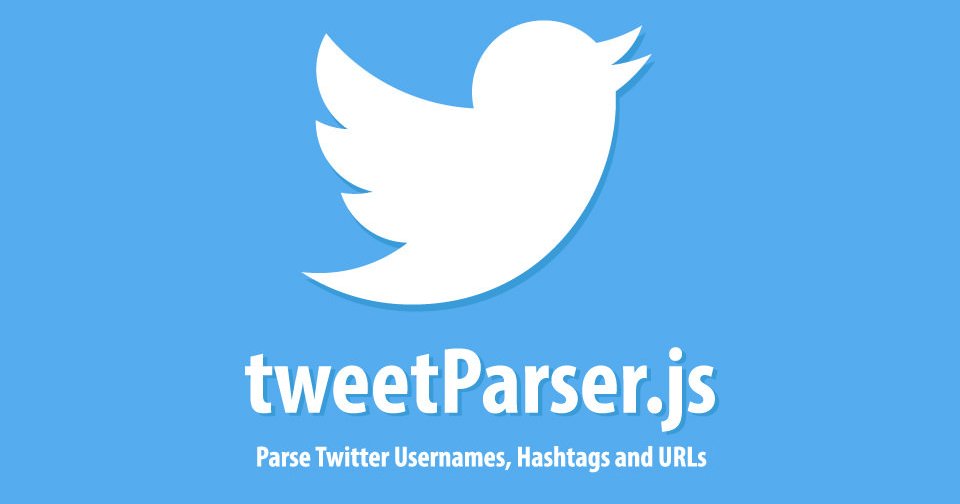tweetParser.js - demo

tweetParser is also available as a Django Template Filter
| Parameters | Type | default | description |
|---|---|---|---|
| urlClass | String | tweet_link | css Class used for url in the tweet |
| userClass | String | tweet_user | css Class used for @user profil url in the tweet |
| hashtagClass | String | hashtag | css Class used for hashtags url in the tweet |
| target | HTML attribute for anchor tags | _blank | target used for all generated |
| searchWithHashtags | Boolean | true | generate hashtag link, if true : "twitter.com/hashtag/", if false : "twitter.com/search?q=" |
| ParseUsers | Boolean | true | will parse @users if is set to true |
| parseUrls | Boolean | true | will parse URLS if is set to true |
| parseHashtags | Boolean | true | will parse hashtags if is set to true |
if you want to use bower just type :
bower install tweetparser.js
npm install --save-dev tweetparser.js
<script src="js/tweetParser.min.js"></script> <p class="tweet">This is my awesome text only tweet ! #web #twitter @twitter http://www.twitter.com/ !!</p> //basic usage
tweetParser('.tweet');
//With Default parameters
tweetParser('.tweet', {
urlClass : "tweet_link", //this is default
userClass : "tweet_user", //this is default
hashtagClass : "hashtag", //this is default
target : "_blank", //this is default
searchWithHashtags : true //this is default
parseUsers : true,
parseHashtags : true,
parseUrls : true
});
// Note that '.tweet' is your own CSS selector <script src="path/to/jquery.min.js"></script>
<script src="path/to/tweetParser.js"></script>and call tweetParser like in v1 :
$([SELECTOR]).tweetParser([PARAMETERS]);Check out the demo
you can customize your tweet with css classes used in parameters
- Give it a star !
- Report a bug
- Tweet about it :)
- Solve a problem
- For code enhancement, use JSLint as a code quality tool.
- Small is better than Big.
-
v2.2.0
- Add Babel in dev dependecies
- Port dev code to es6 syntax
-
v2.1.3
- Fix #10 - target link parameter issue
-
v2.1.2
- Emojis support
-
v2.1.1
- resolve issue #9 - Wrap tweetParser and the jQuery compatibility file in the same file.
-
v2.1.0
- Add a jQuery compatibility file.
- You can now use Both VanillaJS or jQuery.
<!-- To use it with jQuery : add tweetParser.js and jquery.tweetParser.js --> <script src="dist/tweetParser.js"></script> <script src="dev/jquery.tweetParser.js"></script>
and call tweetParser like in v1 :
$([SELECTOR]).tweetParser([PARAMETERS]);
It is always easier to use it without jQuery just don't add jquery.tweetParser.js and :
tweetParser([SELECTOR], [PARAMETERS]);
-
v2.0.2
- Code refactoring
-
v2.0.1
- Fix issue #8 - is now Firefox compatible - replace innerText by textContent
-
v2.0.0
- REMOVE jQuery dependecies...
- ...But it still easy to use it as simple as a jQuery Plugin.
- Improve URL regex : white spaces are not eaten anymore
NB : For you, there is just some small changes in the syntax to call tweetParser.
use
tweetParser([SELECTOR], [PARAMETERS]);instead of :
$([SELECTOR]).tweetParser([PARAMETERS]);-
v1.3.1
- Remove Gruntfile to switch to gulpfile
- Prepare to publish to npm
- Improve the Demo
- Add sourcemaps
-
v1.3.0
- Improve (one more time) URL regex 🙌
-
v1.2.1
- Better URL regex
-
v1.2.0
- add parameter parseUsers, parseHashtags, parseUrls
- Makeover on the demo
- JSLint passed
-
v1.1.0
-
searchWithHashtags parameter added
You can now choose where hashtags links will point to. when searchWithHastags = true (default), tweetParser will generate the following link for each hashtags : "twitter.com/hashtag/THE_HASHTAG".
if you set it to false, the link will be : "twitter.com/search?q=THE_HASHTAG" -
code optimisation, remove useless var.
-
-
v1.0.0
Initial Version
